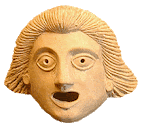Characteristics of Sophocles' plays:
emphasis on individual characters
reduced role of chorus
complex characters, psychologically well-motivated
characters subjected to crisis leading to suffering and self-recognition -
including a higher law above man
exposition carefully motivated
scenes suspensefully climactic
action clear and logical
poetry clear and beautiful
few elaborate visual effects
theme emphasized: the choices of people
The Greeks
Did you see it on TV -- "Modern Classics"? Well, I understnad the problems of "Classic Cola"... If you read the pages on postmiodernism, you know the difficulties we have after the end of history. What is "classics"? I reserved this name for every great script and writer before the Summer of 1968... Why 1968? Summer?
I'll explain it in THR413....
It is amazing how very few good plays exist -- you can finish them all in two semesters, if you are willing to read one play a day.
That is what you should do, read!
Read good literature while you're in school, because later you will read a lot trash. You will be paid to act or direct and most of the time it will be trash...
THR213 Dramlit, The Bedford DRAMA (2002): Aeschylus - Agamemnon? Sophocles -- Oedipus Rex (would love to cover Euripides - Medea). Fall 2002: Aristophanes "Lysistrata"! Next -- Marlowe (Doctor Faustus?)
Moliere
Questions:
What is Protogonist?
How do you understand the functions of Chorus?
Fate concept. Explain it.
Name three Greek playwrights...
That was the test. If you can't answer the questions, you should take the class!
Critical commentaries together with Oedipus: Poetics, Freud, Levi-Strauss (structuralism and myth; avegetation myth, Taplin ("tragedy is essentially the emotional experience of its audience").
Some Links:
Oedipus: summary
ClassicNotes
allfreeessays.com
Dramatic Irony & Guide
The Shrew * Fall 2004 UAF * "The Greek vision focused on the immediacy of experience and on the nature of man: Man is free, but fated, fated but free. What qualities does he reveal? Through suffering, what does he learn, not about the gods, for they are simply “given”, but about himself? Oepidus the King is Sophocles’ farthest penetration into these mysteries." [ yale.edu ]
Summary
OEDIPUS THE KING online * Theatre UAF 2005 Rex *"Fear? What should a man fear? It's all chance, chance rules our lives. Not a man on earth can see a day ahead, groping through the dark. Better to live at random, best we can. And as for this marriage with your mother—have no fear. Many a man before you, in his dreams, has shared his mother's bed. Take such things for shadows, nothing at all— Live, Oedipus, as if there's no tomorrow!" (Oedipus the King, 1068–1078)
Questions
Greek playwrights used the chorus primarily to:A. move scenery from the skene.
B. comment on the action.
C. welcome magistrates to the theatron.
D. play musical instruments.
Notes
"People of Thebes, my countrymen, look on Oedipus. He solved the famous riddle with his brilliance, he rose to power, a man beyond all power. Who could behold his greatness without envy? Now what a black sea of terror has overwhelmed him. Now as we keep our watch and wait the final day, count no man happy till he dies, free of pain at last." (Oedipus the King, 1678–1684)
Tragedy : case-study
Describe the exposition revealed in the Prologue.
Create a staged reading of the debate between Kreon and Oedipus in scene ii. Discuss the use of logic and reason by each character.
Explain Teiresias's cryptic dialogue. What prevents him from speaking plainly?
Discuss Oedipus's journey toward the truth of his biography. What human instincts prevent him from "seeing" the truth?
Describe the acts of violence that occur off stage. How would you stage these events today?
THE PRIEST OF ZEUS
CREON
CHORUS OF THEBAN ELDERS
TEIRESIAS
JOCASTA
MESSENGER
HERD OF LAIUS
SECOND MESSENGER
SCENE: THEBES. BEFORE THE PALACE OF OEDIPUS
To do it in 2005 (Spring) -- Kabuki Style? See Rashomon Project.
Sophocles (496?-406 b.c.). Born into a wealthy family at Colonus, a village just outside Athens, Sophocles distinguished himself early in life as a performer, musician, and athlete. Our knowledge of him is based on a very few ancient laudatory notices, but he certainly had a brilliant career as one of the three great Greek classical tragedians (the other two are Aeschylus, an older contemporary, and Euripides, a younger contemporary).
He won the drama competition associated with the Dionysian festival (entries consisted of a tragic trilogy and a farce) at least twenty times (far more often than his two principal rivals). However, Oedipus Rex, his most famous tragedy, and the three other plays it was grouped with, took second place (ca. 429 b.c.).
He lived during the golden age of Athens, when architecture, philosophy, and the arts flourished under Pericles. In 440 b.c., Sophocles was elected as one of the ten strategoi (military commanders), an indication of his stature in Athens. But his long life ended in sadder times, when the Peloponnesian War (431-404 b.c.), between the Athenian empire and an alliance led by Sparta, darkened the region.
Though Sophocles wrote some 123 plays, only 7 have survived; nonetheless, these few works establish him as the greatest of the ancient Western tragedians.
Fall 2005 -- Pygmalion? No.
It is obvious that the great triumvirate of Greek tragedy--Aeschylus, Sophocles, and Euripides--did not, like Minerva, spring full-armed from the head of Zeus, but were the end products of a long line of development. Several reputable scholars have pointed out that Egyptian culture was greatly admired by the Greeks, among other reasons for its religious development. Even Herodotus, Greek historian living in the fifth century B.C., held that the Greek Dionysus was but a slightly disguised Egyptian Osiris, whose suffering, death, and resurrection made him the symbol of the renewal of life and the yearly round of the seasons. It has been suggested that the acceptance of the Egyptian deity and his "naturalization" into Greek legend brought ceremonies to Greece which, for the first time, can truly be called dramatic. (Roberts 21)




